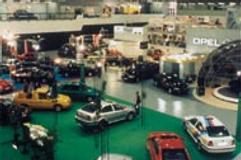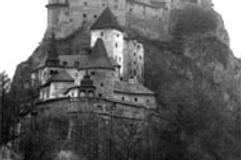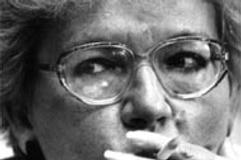Archive of articles - March 1998
If you desire to read an old article, use the search bar or select the publication date.
Technology Watch
"Used", "Second Hand", or "Pre-owned", call them what you will, but the truth remains - not all computers on the market are new. While new computer sales have been booming, the market for used computers is as active as ever.There is some truth to the common belief that one needs the latest and greatest hardware to be able to run all of the hot software available. But most office and home applications for PC are able to run on a simple 486 processor, some even on an ancient 386. Windows 95 will run on a low-end 486, while newer versions, Windows 98 or 99, will probably require a Pentium processor.
Where to buy a used car
If you are tired of taking a tram, trolley-bus, or of paying exhorbiant rental car prices, but think a new car is just a little outside your price range, the time to act is now. Just brush up on your Slovak and head to one of the many used car lots scattered around the capital.All together, there are 22 used car lots in Bratislava, of which we chose nine reccommended by the Slovak Auto Association as legitimate and geographically dispersed. Most lots offer the same old thing - dealers eager to sell their cars fast, and with as little hassle with the customer as they can manage.
Economic growth slowed in January
The Slovak economy showed further signs of slowdown in January, and economists blamed the slump on high real interest rates. The recent easing of the central bank's monetary policy, which began in mid-February, came too late to affect the January figures, they maintain."The economy overall has been slowing for some time, and that's not surprising with such high interest rates," said one London-based economist. "We'll have to wait and see whether the change in monetary policy reverses the trend at all."
Gabčíkovo dam dispute drags on
"Even if the right to go back to the Hague exists, there is no reason to do so. It is absolutely unnecessary."Arpád Prandler, Hungary's lead negotiatorSlovakia and Hungary have failed to sign a draft agreement on how the joint operation of the Danube dam project will proceed before March 25, a deadline both sides agreed upon before the Hague-based International Court of Justice last September. After this date, Slovakia may turn to the court again, as it is the Hungarian side that is hindering the negotiation process.The Hungarian side claims it wants to examine further the fine print in the proposed solution before signing the document, citing mostly environmental concerns.Hungarian Foreign Minister László Kovács told the Hungarian Press Agency (MTI) that Hungary still wanted to reach an agreement but had asked for more time "because in our opinion, further examination and calculations are needed for a reassuring decision".
Import surcharge narrows trade gap
Slovakia's partial recovery from its 1996 trade balance shortfall of 70.26 billion Sk ($2 billion, or 12.1 percent of GDP) has never set more than one hand clapping - that of the Ministry of Economy (MH). And now that the results for January 1998 have been digested by analysts, critics are even more inclined to boo the MH than to praise it.The problem is that the MH and its detractors can't agree on whether the foreign trade cup is half full or half empty. Although in 1997 the trade balance deficit was cut to 49.5 billion Sk ($1.41 billion, or 7.7 percent of GDP), January 1998 figures show exports down 14.3 percent compared to January 1997, fuelling claims that the trade balance was improved artificially through the reintroduction of a 7 percent surcharge on July 21, 1997. Analysts said that the duty, in choking off imports, had also left exporters gasping for air.
Rates bounce back, crown predicted to remain stable
The end of the first March period of minimum reserve requirement (PMR) was marked by a high liquidity surplus on the interbank market. This surplus pushed the shortest maturities - one-day deposits - to 1.0 percent on March 15.At the beginning of the current PMR period, the National Bank of Slovakia (NBS) reiterated its intention to achieve the lowering of longer-term interbank interest rates, which continue to trade above 20 percent. The NBS has kept the market in a liquidity surplus by adding crown funds through two-week refinancing repo tenders. But this has so far affected mainly deposits with maturities of up to one month, which have traded between 11 percent (one-day money) and 17 percent (one-month funds).
New Christian party emerging
The Christian Social Union (KSU) was originally established in March 1992, splitting off from the KDH (Christian Democratic Movement), which had aimed to organize an all-encompassing Christian political party after the velvet revolution in 1989. The ostensible reason for the KSU's break from the KDH was a difference in philosophy - the KSU supported the establishment of an independent Slovak Republic, whereas the KDH was struggling to keep the Czech and Slovak Federal Republic united.Today, KSU policy is similar to that of the conservative Christian Socialist Party (CSU) in Bavaria, Germany. The KSU wants to reduce the role of the state in business and to give more political power to the regions. The KSU has not been considered a serious party until recently, when they reached the four percent support mark in the Slovak Statistical Office's most recent citizen poll of party preference in October 1997.
New election law proposal draws criticism
The political inferno ignited by Prime Minister Vladimír Mečiar's use of Presidential powers had scarcely abated before the government unveiled a controversial new election law proposal on March 5, engulfing Mečiar's ruling coalition in a fresh wave of criticism.The proposal was scheduled for first reading in Parliament on March 24. A simple 76 vote majority is required for the law's approval; the governing coalition has 81 votes. It is expected that the final version will be passed during the May session, leaving the opposition only three months to adapt to the new rules of the game before national elections in September.
Bratislava Autosalon bets that spring showing will boost fair
Autosalon Bratislava and Autosalon Nitra used to both be fall events, but in 1998 fair organizers Incheba a.s. Bratislava and the Slovak Automotive Industry Association surgically separated these "twins" into a spring and fall show.Bratislava Autosalon, now held from April 1-5, 1998, is focused mainly on personal car purchasers, and the exhibitors are mostly car retailers. "As importers, we do not participate in Bratislava Autosalon - we send our retailers. We go to Nitra because it is different and more important to us." said Karol Hudec, Marketing Department of Škoda Slovakia.
Mečiar harangue spurs HZDS into action
Premier Vladimír Mečiar is determined to steamroll everything that stands in the way of his winning this year's parliamentary elections. State administration offices throughout the country have been organized to help him in achieving this goal, as will be the Office of the Government, where experts are working on Mečiar's election program.Speaking at a January 24 party conference of his Movement for a Democratic Slovakia (HZDS) in Martin, Mečiar revealed several key parts of his election plan. Details of the speech were leaked to the Práca daily about a month later.
The Dubliner cares more about serving drinks than food
After a productive morning meeting, my associates and I decided to grab a bite to eat. The Dubliner, known as the Irish Pub, was close to the office, so off we went. Most of us had, of course, been to this famous expat Bratislava hangout before, and felt it was time we sampled the epicurean delights. I was dying for a steak, so I went for the 200 gram carnivore special, cooked rare with pepper sauce. The fully loaded spud was the perfect partner for my slab of meat. My fellow diners chose the Irish Stew, a steak sandwich and a couple of stuffed spuds covered with cheese, one with and one without ham. After ordering, we spent half an hour in idle shop talk before the first meal arrived - the Irish Stew, advertised as "containing Guinness". Maybe they poured the beer in after taking the stew out of the microwave, for the meal was luke warm.
Orava: Fragrant meadows, clear water and blue mountains invite visitors
"I greet you, forests and mountains, from the bottom of my soul I greet you..." wrote the great Slovak poet, Pavol Orsagh Hviezdoslav, who worshipped the Orava region's beauty. Orava - once worshipped, once damned - has had its share of hard times throughout its history.The land itself is cruel. Communications links forged in the previous century neglected Orava's rough terrain. Economic depression in the late 19th and early 20th centuries caused high unemployment and starvation in the region. Orava's shacks could offer little relief from the hard life. Over the years, Orava has sent forth its sons to Belgian, French and American mines, Chicago slaughterhouses, Canadian forests and South American plantations. Orava's past is now the stuff of many outdoor and indoor museums, though its present face is quite different.
Civic initiative to prevent election rigging
Proposing to dispel the fog of public apathy and secure democratic national elections for September this year, an initiative called Civic Campaign '98 (OK'98), was announced on March 3 in Zvolen by representatives of 35 non-governmental organizations (NGOs), including US AID, the Center for European Politics, the National Democratic Institute and the British Know How Fund.The initiative claims that a considerable number of Slovak citizens have lost their confidence in the current ruling coalition. "Like the majority of our fellow citizens, we feel a deep distrust in our government," the initiative's founding statement reads. "The feeling is spreading among citizens that their votes cannot alter developments in society."
SAX falls to all-time low due to VSŽ's continued losses
Market developmentsThe market did not see any turnaround during the last two weeks, but instead saw the SAX index fall to an all-time low of 136.1 on March 12. Continued political uncertainty coupled with pessimistic expectations for 1998 corporate earnings are taking their toll. The SAX was pulled down by heavy losses in VSŽ stock, which at one point traded below 400 Sk per share. On the other hand, Slovnaft and Slovakofarma, with their strong fundamentals and credible management, showed resistance to the market downturn. These stocks should be recommended to portfolio investors, since both are undervalued and their long-term potential is not priced in yet.The Slovak Statistical Office announced that real 1997 GDP growth was 6.5 percent, while most previous estimates had been for 6.0 percent. The figure shows that economic expansion is robust in spite of the NBS's tight monetary policy.
Slovak foreign service castled
On March 3, 1998, Prime Minister Vladimír Mečiar's cabinet used its presidential powers to recall 28 ambassadors, arousing a storm of protest from the opposition and former diplomats who reserved special criticism for the extent of the change and the fact that politicians are to replace career diplomats."The ambassadors are going to be replaced by politicians, who are going to be rewarded for their loyalty and service to the governing parties," said Štefan Markuš, the chairman of the Slovak Helsinki Committee.Milan Tokár, spokesman of the Foreign Affairs Ministry, did not deny that there would be HZDS members among the new ambassadors. But he added that all ambassadors recalled had served a normal three-year term, and would be replaced by the government within a span of several months from March until September.
PNS privatization attacked by media
The state privatization agency, the National Property Fund (FNM), just can't stay out of the headlines. In mid February, it became the flash-point for a wave of public indignation at corrupt privatization methods after the business weekly Trend revealed that between 1995 and 1997 the FNM had sold state properties for an average of only 47 percent of their market value.Nothing daunted, the FNM decided on February 20 to sell 97 percent of shares in the print media distribution company, Prvá novinová spoločnosť (PNS), to Danubiaprint, a media octopus which prints most nationwide dailies and whose management has close ties to Mečiar's HZDS. (See Danubiaprint profile, page 6).
- Pastoral letter divides Slovaks
- News digest: Slovakia is being hurt by its failure to integrate foreign workers, says auditor
- Hollywood turns Slovak highlands into high-speed playground Video
- News digest: ‘Charlatans and quacks’: Pandemic investigator accuses scientists, pushes for jab ban Video
- Authoritarian echoes from Delhi to Bratislava
- Top 10 events in Bratislava for foreigners
- A café in an ice cellar, sand dunes and a flower shop at the border
- Forget the spa – Bojnice’s trails are the real therapy Photo
- A café in an ice cellar, sand dunes and a flower shop at the border
- Top 10 events in Bratislava for foreigners
- Bratislava opens new support centre for foreigners
- News digest: ‘Charlatans and quacks’: Pandemic investigator accuses scientists, pushes for jab ban Video
- You say nazdar, I say dovi
- Pastoral letter divides Slovaks
- Neuroimmunologist Norbert Žilka: Slovakia in Alzheimer's research premier league
- Hollywood turns Slovak highlands into high-speed playground Video
- Bratislava opens new support centre for foreigners
- Hollywood turns Slovak highlands into high-speed playground Video
- You say nazdar, I say dovi
- A café in an ice cellar, sand dunes and a flower shop at the border
- Top 10 events in Bratislava for foreigners
- Independent cultural space on Bratislava embankment to end soon
- Záhorie uncovered: Slovakia’s quiet corner full of surprises Photo
- Chicken Jockey! Chicken Jockey! Chicken Jockey! Video
- Last Week: And then they came for the NGOs
- What abides: Giving a shit
- Slovakia brings back border checks with Hungary and Austria starting April 8
- Bratislava opens new support centre for foreigners
- Hollywood turns Slovak highlands into high-speed playground Video
- Štítnik resumes hand-crafting Christmas ornaments after 25 years
- You say nazdar, I say dovi
- A café in an ice cellar, sand dunes and a flower shop at the border
- News digest: Slovakia is being hurt by its failure to integrate foreign workers, says auditor
- Forget the spa – Bojnice’s trails are the real therapy Photo
- Košice steelworks sinks deeper into the red
- A 'pink moon' will grace Slovak skies this Sunday
- Authoritarian echoes from Delhi to Bratislava
- Weekend: A sports event to get your running fix Photo
- Record-breaking Bratislava Marathon supports visually impaired athletes
- News digest: ‘Charlatans and quacks’: Pandemic investigator accuses scientists, pushes for jab ban Video More articles ›






